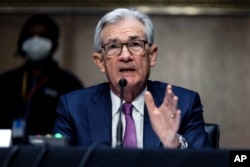A sharp sell-off left the Dow Jones Industrial Average more than 1,000 points lower Thursday, wiping out the gains from Wall Street’s biggest rally in two years, as worries grow that the higher interest rates the Federal Reserve is using in its fight against inflation will derail the economy.
The benchmark S&P 500 fell 3.6%, marking its biggest loss in nearly two years, a day after it posted its biggest gain since May 2020. The Nasdaq slumped 5%, its worst drop since June 2020. The losses by the Dow and the other indexes offset the gains from a day earlier.
“Yesterday’s sharp rally was not rooted in reality, and today’s dramatic selloff is a reversal of that misplaced exuberance,” said Ben Kirby, co-head of investments at Thornburg Investment Management.
Wall Street’s breakneck day-to-day reversal reflects the degree of investors’ uncertainty and unease over the array of threats the economy is facing, starting with inflation running at the highest level in four decades, and how effective the Federal Reserve’s bid to tame higher prices by jacking up interest rates will be.
On Wednesday, the Federal Reserve announced a widely expected half-percentage point increase in its short-term interest rate. Stocks bounced around following the move but then sharply rose as bond yields fell after Fed Chair Jerome Powell reassured investors by saying the central bank wasn’t considering shifting to more aggressive, three-quarter point rate hikes as the Fed continues with further rate increases in coming months.
But whatever relief Powell’s remarks gave stock investors vanished Thursday. Stocks slumped and bond yields climbed. The yield on the 10-year Treasury note rose to 3.04%. Rising yields are sure to put upward pressure on mortgage rates, which are at their highest level since 2009.
Investors remain uneasy about whether the Fed can do enough to tame inflation without tipping the economy, which is showing signs of slowing, into a recession. In addition to high inflation and rising interest rates, investors are grappling with uncertainty over lingering supply chain disruptions and geopolitical tensions.
“The biggest issue is there are just a lot of moving parts and the unanswered question is to what extent as the Fed attempts to tame inflation will that result in economic slowing, and perhaps, a recession,” said Terry Sandven, chief equity strategist at U.S. Bank Wealth Management.
The S&P 500 fell 153.30 points to 4,146.87, while the Nasdaq slid 647.16 points to 12,317.69. The Dow briefly skidded 1,375 points before closing down 1,063.09 points, or 3.1%, to 32,997.97.
Smaller company stocks also fell sharply. The Russell 2000 fell 78.77 points, or 4%, to 1,871.15.

